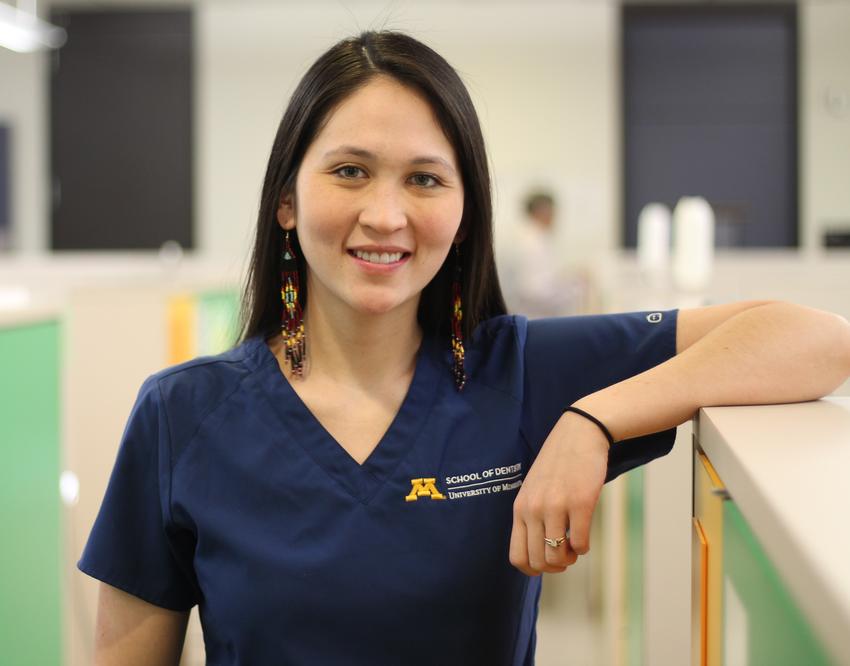Homeward Bound

When Victoria Gokee completes her Doctor of Dental Surgery degree at the University of Minnesota in two years, she is headed home to the southern shores of Lake Superior where she grew up surrounded by a large extended family and fellow members of the Red Cliff Tribe of Ojibwe.
“After literally living around the world, I can confidently say that my heart is drawn to my ancestral homeland,” she said. “People often talk about being ‘stuck on the reservation.’ I choose to return to serve my tribe as a dentist and show future generations that growing up on a reservation doesn't hinder what we are capable of achieving.”
Gokee had several options for dental school but ultimately chose the University of Minnesota. While she says the School of Dentistry has been a perfect fit so far, her first semester did not start out as she had envisioned. Her daughter, Bagamwewekamigishkamookwe, was born two days before the first day of class, causing her to miss the important first three weeks of dental school.
“I established a lot of relationships with faculty and administration,” she said. “They were all understanding and flexible, but also made sure that I skipped nothing. The program is rigorous and builds on itself.”
Gokee’s husband Joseph, also a University of Minnesota student majoring in Ojibwe language, took primary responsibility for their baby that first semester, bringing her to school at scheduled times between classes for feedings with her mom. Together, they made it work and Gokee closed out the first semester in step with her classmates.
After completing dental school Gokee plans to work as a general dentist for Indian Health Service on the Red Cliff or nearby Bad River reservation. Unlike many children on the reservation, she was exposed to dentistry early and often, in part, because she was born with a congenital condition in which two teeth did not develop properly. She said she enjoyed her visits to the clinic as a child, but understands why so many others in her community avoid the dentist until they are in pain.
“We have always had a high rate of turnover in dentists,” Gokee says about the dentists on the Red Cliff and Bad River reservations. “There is no opportunity to build a trusting relationship because the providers seem to come out of nowhere, then they’re gone after six months to a year. I want others to feel the same excitement I had going to the dentist, and the feel of regular hygiene appointments and clean teeth. I want to build relationships.”
While Gokee has been away from home most of the last seven years, she visits regularly for celebrations such as round dances and pow wows and traditional practices such as the wild rice and berry harvests. She has also been engaging in traditional lacrosse, a game that is meant for healing. She works with youth to make sticks for the game out of white ash.
“People know me; they know I understand the culture, the challenges, and the way of life that is so important,” she said.
In high school, Gokee studied abroad for a year in Pompeii, Italy. She loved this experience and returned to Italy again for a full year during college, first studying in Rome and then Milan, where all her classes were taught in Italian. She is fluent in Italian and is working on learning Ojibwe, but believes her strength is in the sciences. She majored in biomedical sciences with a minor in business administration at Marquette University in Milwaukee, WI.
With their daughter now 18 months old, they have settled into their lives as full-time students and are finding the Twin Cities campus a comfortable place for indigenous students.
“We have made lot of indigenous friends here from all over the place,” Gokee said. “And the University has dedicated physical spaces for us on campus. These things matter. It is nice to feel recognized in this way. I feel I have a lot of support here. These are indigenous homelands and it is nice that the University acknowledges this.”
While Gokee is enjoying her time at the University, she and her family are looking forward to moving back home in two years, equipped with new perspectives, new friends, and professional skills to help their community thrive.
“There is a pull that I feel, to be fully engaged with my community, a deep connection to my ancestors and sacred homeland,” she said. “Dentistry gives me a challenging career that will enable me to make a difference.”